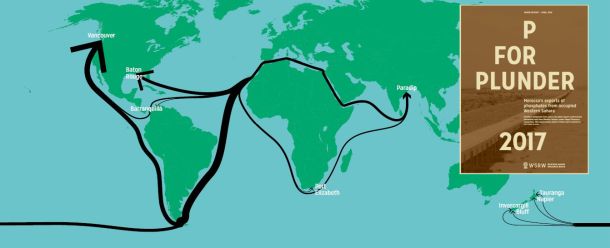
Siemens Energy will only talk with the government of Morocco with regard to Western Sahara, according to recent company statement.
“Siemens Gamesa Renewable Energy has not held talks with political representatives outside the government. It is not SGRE's role to engage in political debates and seek political approval for the wind farm project”, the Board of Siemens Energy AG stated at its Annual General Meeting on 10 February 2021.
Siemens Energy holds 67% of the shares in Siemens Gamesa Renewable Energy (SGRE), provider of wind turbines for the two operational and several additionally planned wind farms erected by the Moroccan government in occupied Western Sahara. The two operational wind farms, Foum el Oued and Aftissat, serve industrial end-users, such as Morocco’s state-owned company OCP’s subsiary Phosboucraa, which illegally exploits the phosphate reserves of the Non-Self-Governing Territory. In September 2020, the company issued a press release on obtaining the contract for the 300-MW Boujdour wind farm, locating it “in the South of Morocco". Boujdour is a town located mid-coast, Western Sahara.
Just one month ago, both Siemens Gamesa and Siemens Energy were excluded by Norway's largest private asset manager for contributing to violations of international law in occupied Western Sahara.
For years, different entities in the Siemens parental structure that are connected to the wind farms in occupied Western Sahara, have avoided answering whether the people of Western Sahara had given their consent to Siemens' participation in the construction of energy infrastructure on their land. Instead, Siemens would argue that its projects are to “benefit” the local “populations” in the area, leaving aside the legally more important matter of whether the people of the territory actually want the projects or not.
WSRW has today sent a letter to Siemens Energy asking for further clarifications on several statements made during the recent AGM.
- “When you state that SGRE has not held talks “outside the government”, does it refer to the government of Morocco?”, the letter reads.
- “Considering that the Court of Justice of the EU specifically refers to Western Sahara and Morocco as ‘separate and distinct’ territories, and considering that Morocco’s claims to the territory have been rejected by the International Court of Justice and the international community, why would your company consider political representatives that are part of Morocco’s governmental structure to be representative for Western Sahara? With regard to the last sentence of your statement: is it implied that SGRE does not view it necessary to obtain consent from the people of Western Sahara for activities in the territory?”
The question of consent is a key principle stemming from the people of Western Sahara’s right to self-determination, as stipulated by the International Court of Justice and backed by the international community. In recent years, the EU Court of Justice concluded in that Western Sahara is not part of Morocco, that the latter has no mandate to administer the territory, and that given the separate and distinct status of Western Sahara, the consent of the people of the territory is required for any EU agreement with Morocco to lawfully affect the land.
“As a matter of policy, Siemens Energy and Siemens Gamesa do not take positions on matters of international public law", the company retorts whenever legal concerns are raised. The company stated at the AGM that "this situation requires a political solution involving governments, not companies".
“It is obvious that the solution to the conflict in Western Sahara must be reached by governments. We think no one asks or expects Siemens Energy to solve the conflict. Our only appeal to your company is to not undermine the UN efforts to reach a solution which will provide for the right to self-determination”, WSRW today wrote in a letter to the company.
“We find it remarkable that an EU-based company does not deem the reasoning of the highest Court of the EU to have any bearing on its operations. In our view, Siemens Energy cannot simply close its eyes to the fact that Western Sahara is not part of Morocco. Your company is directly contributing to make it less likely that Morocco will engage to resolve the conflict in line with UN resolutions", stated the letter.
WSRW called on Siemens Gamesa to follow the recent decisions of Continental and Epiroc, that have both ended their supplies to the Moroccan state company OCP's exports of conlict minerals from the territory, a role that Siemens Gamesa still plays.
An English translation of WSRW's transcript of Siemens Energy's statement at the AGM can be accessed here. The text of a countermotion presented to the AGM by Dachverband der Kritische Aktionärinnen und Aktionäre can be found here.
New report: Western Sahara phosphate trade halved
The export of phosphate rock from occupied Western Sahara has never been lower than in 2019. This is revealed in the new WSRW report P for Plunder, published today.
Siemens again refuses to answer questions about Western Sahara at AGM
For the fourth consecutive year, the German engineering company dodges questions at its Annual Shareholders Meeting as to whether it has obtained the consent of the people of Western Sahara to operate on their land.
New report on Western Sahara phosphate industry out now
Morocco shipped 1.93 million tonnes of phosphate out of occupied Western Sahara in 2018, worth an estimated $164 million, new report shows. Here is all you need to know about the volume, values, vessels and clients.
New report on contentious Western Sahara phosphate trade
Morocco shipped over 1.5 million tonnes of phosphate out of occupied Western Sahara in 2017, to the tune of over $142 million. But the number of international importers of the contentious conflict mineral is waning, WSRW's annual report shows.



